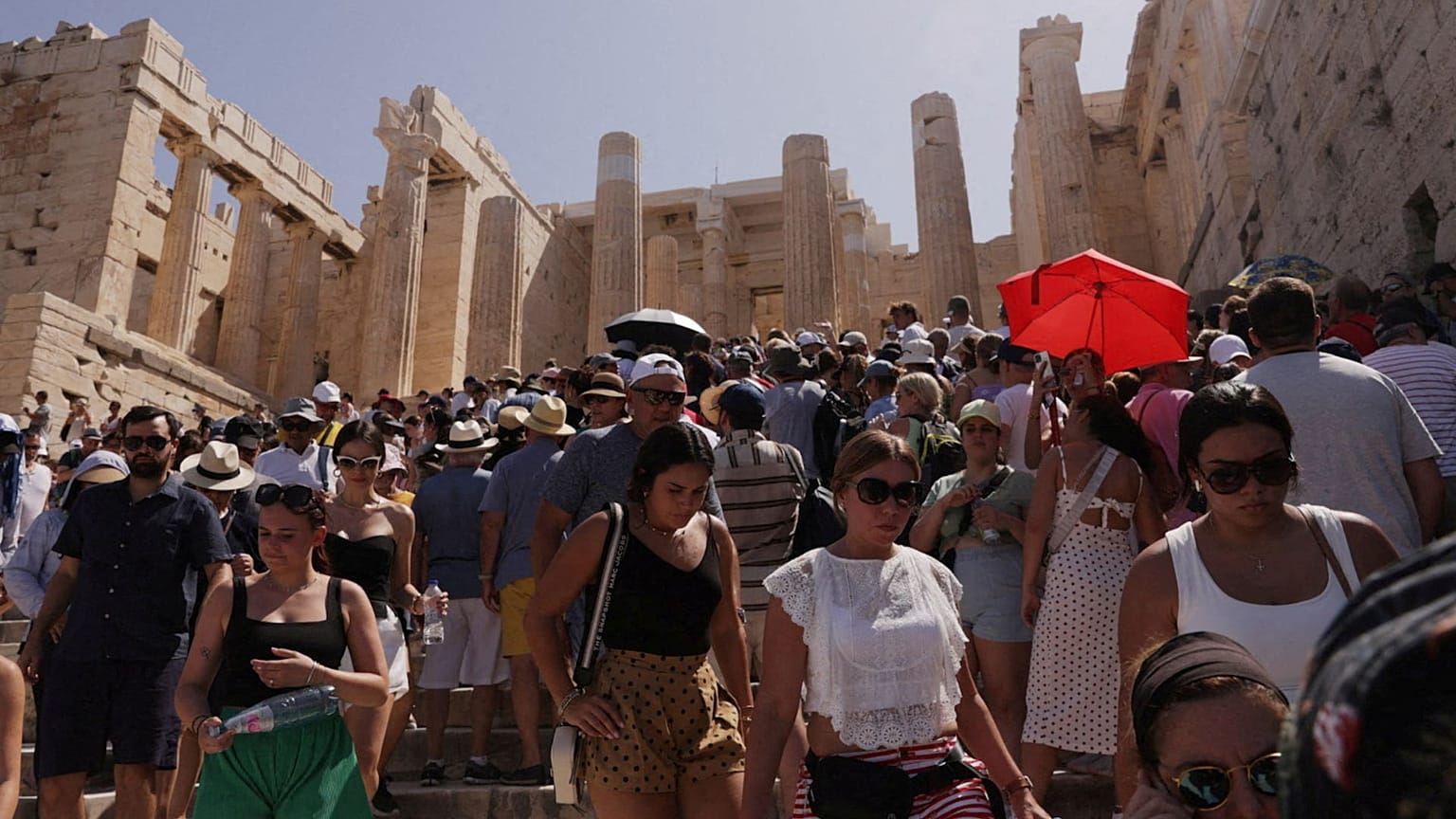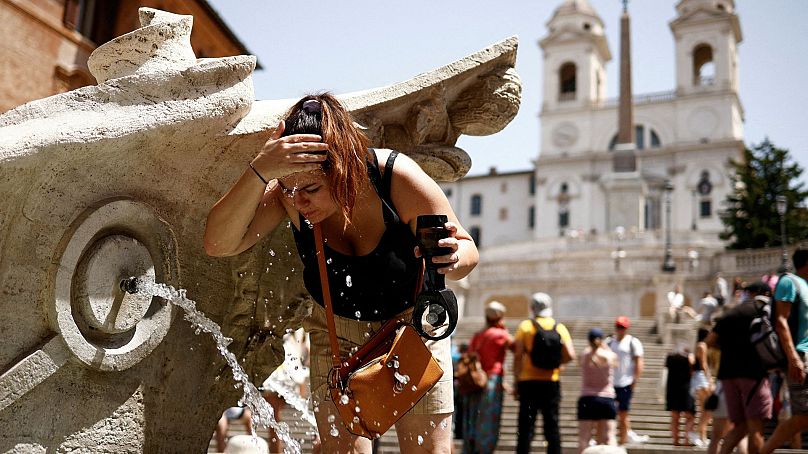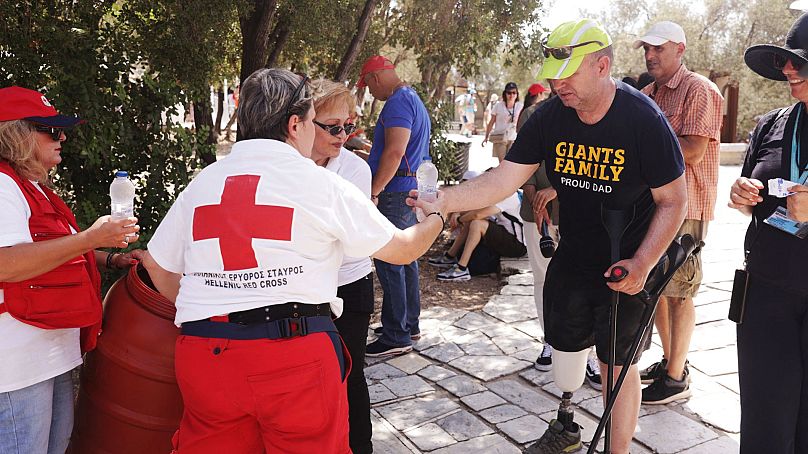Some holidaymakers have cut trips short after experiencing headaches, dizziness and swollen fingers.
Europe’s unrelenting heatwave has prompted travel alerts and weather warnings - but tourists seem undeterred.
 ADVERTISEMENT
ADVERTISEMENT
 ADVERTISEMENT
ADVERTISEMENT
UK travellers in particular are pressing ahead with holiday plans as the government has issued weather warnings but fallen short of warning against all travel. This means insurance companies are unlikely to cover the costs of a cancelled trip.
Parts of Spain, Italy, Greece and Turkey have been hit by temperatures over 40C in recent days.
Travel companies are informing customers on how to stay safe in the heat, but none contacted by Euronews Travel reported a spike in cancellations.
Can you claim insurance if you cancel your trip due to the heatwave?
Unless an advisory is issued against all travel, it’s unlikely that you’ll be able to claim insurance for trips cancelled due to the heatwave.
Exceptions to this would be if you are considered medically unfit to travel in the heat and have a doctor’s certificate as proof.
Travel insurance is still essential - especially due to the increased medical risk of travelling during extreme heat.
If you are concerned about travelling during the heatwave, you may be able to change your travel dates or destination through your trip provider.
Is the heatwave changing people’s travel habits?
Soaring summer temperatures across southern Europe could change the face of tourism in the region in future, however.
Travellers are likely to start choosing cooler destinations or taking their holidays in spring and autumn to dodge the extreme heat, tourism bodies and experts predict.
The number of people hoping to travel to the Mediterranean region from June to November has already fallen 10 per cent compared to last year, when scorching weather led to droughts and wildfires, according to European Travel Commission (ETC) data.
Destinations like Czechia, Denmark, Ireland and Bulgaria, meanwhile, have seen a spike in interest.
Extreme weather is impacting travellers’ choices
“We anticipate that unpredictable weather conditions in the future will have a greater impact on travellers' choices in Europe,” says Miguel Sanz, head of the ETC.
A report by the trade body also shows 7.6 per cent of travellers now see extreme weather events as a major concern for trips between June and November.
Among them are Anita Elshoy and her husband, who returned home to Norway from their favourite vacation spot of Vasanello, a village north of Rome, a week earlier than planned this month as temperatures reached around 35°C.
“[I] got a lot of pain in the head, legs and [my] fingers swelled up and I became more and more dizzy,” Elshoy says of her heat-related symptoms.
“We were supposed to be there for two weeks, but we couldn't [stay] because of the heat.”
Are travellers cancelling their trips due to the heat?
Demand for travel has soared again this summer as tourists leave behind years of pandemic restrictions.
Brits in particular have booked fewer holidays at home and more in the Mediterranean, often many months in advance, as they continue to crave post-lockdown beach escapes, says Sean Tipton of British travel agent group ABTA.
But that balance could shift as heatwaves are set to become more gruelling. Scientists have long warned that climate change, caused by CO2 emissions from burning fossil fuels, will make weather events more frequent, severe and deadly.
While it hasn’t prompted a rise in cancellations, the heatwave “certainly makes the holiday experience less enjoyable for guests,” says Catherine Livesley, founder of flight-free tour operator No Fly Travel Club.
She adds that another unfortunate impact of the heatwave is making a “tradeoff between emissions and guest comfort”, as air-conditioning becomes a health and safety requirement for travellers.
Meteorologists predict that temperatures in the coming week may surpass Europe's current record of 48.8°C, set in Sicily in August 2021, raising fears of a repetition of last year's heat deaths.
Stories of tourists being airlifted off Italian beaches or ferried away in ambulances from Athens' Acropolis have flooded European media in recent weeks.
“Our recent research indicates a decline in the number of people interested in travelling in August, the peak month, while more Europeans are considering autumn trips,” Sanz says.
Will peak travel seasons shift due to heatwaves?
Tourists in Rome told news agency Reuters they would think twice about booking a trip there again in July as they struggled to drink enough water, stay cool and find air-conditioned spots to rest.
“I would come when it's colder. Only June, April,” said Dalphna Niebuhr, an American tourist on holiday with her husband in Rome this week, who said the heat was making her visit “miserable”.
That's bad news for Italy's economy, which thrives on busy summer traffic.
Italy's Environment Ministry warned in a report this year that foreign tourists would in the future travel more in the spring and autumn and choose cooler destinations.
“The balance will be negative, also because part of the Italian tourists will contribute to the flow of international tourism to less hot countries,” the report said.
Could changing travel habits help curb overtourism?
Some hope that the change will simply be a shift in traffic, not a reduction.
In Greece, international air arrivals were up 87.5 per cent year-on-year between January and March. Overcrowding in the summer has plagued tourist hot spots like the island of Mykonos.
Greek authorities closed Athens' ancient Acropolis during the hottest part of the day on Friday and Saturday to protect tourists.
Increased travel in the winter, spring and autumn months could ease that problem and make up for a potential summer slowdown, according to the Greek environment ministry.
In Spain, high demand for holidays is expected in coastal destinations in the north of the country and on Spanish tourist islands, where summer temperatures tend to be cooler, according to a report from national tourism association Exceltur.
Spaniards Daniel Otero and Rebeca Vazquez, who were visiting Bilbao, said they might move their holiday to June next year, when it would be cooler and more comfortable.
For Elshoy, summers in southern Europe may be a thing of the past. She said she will consider holidaying in her home country of Norway instead.
“I don't want to have a holiday where I have a headache and am dizzy again,” she added.



















